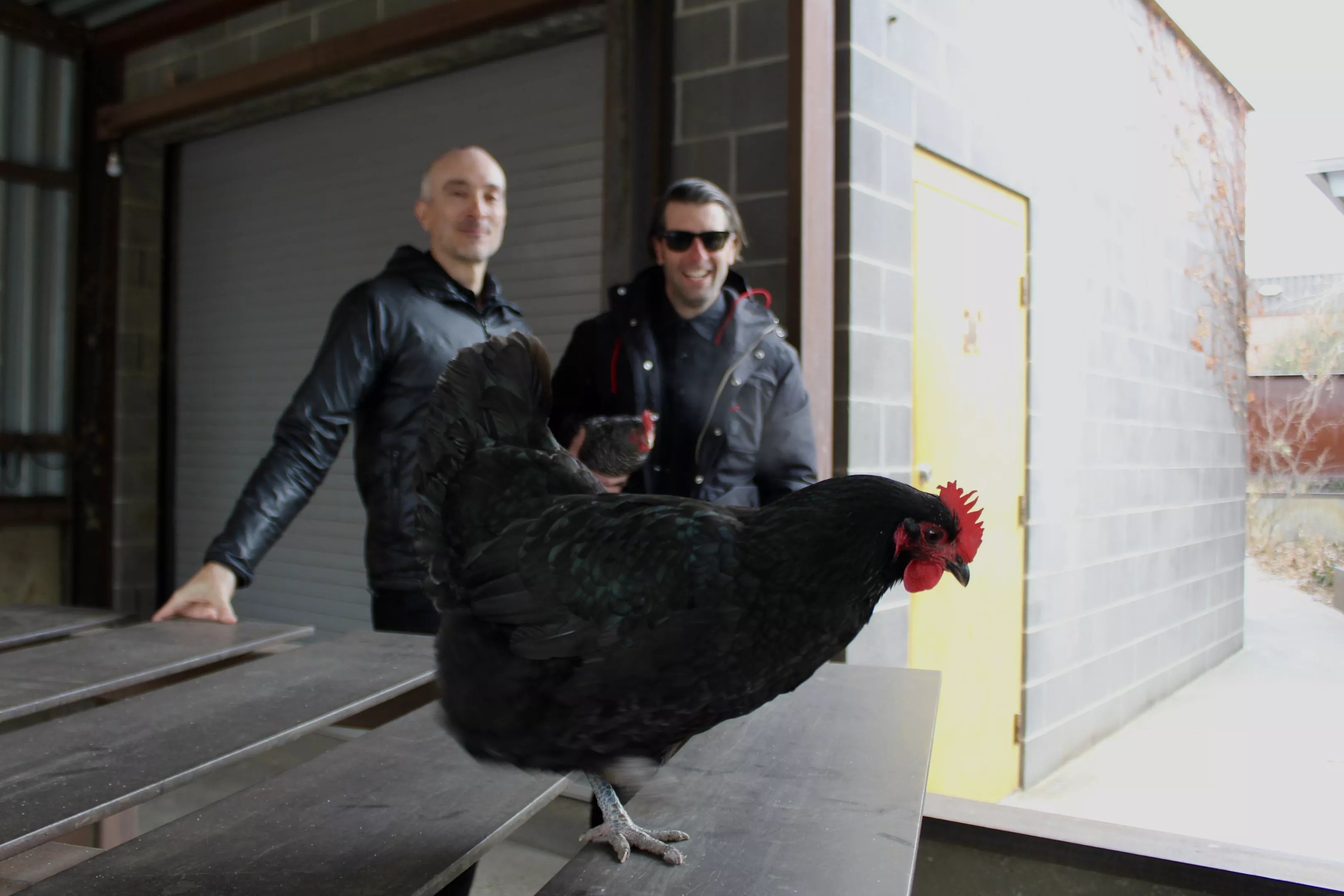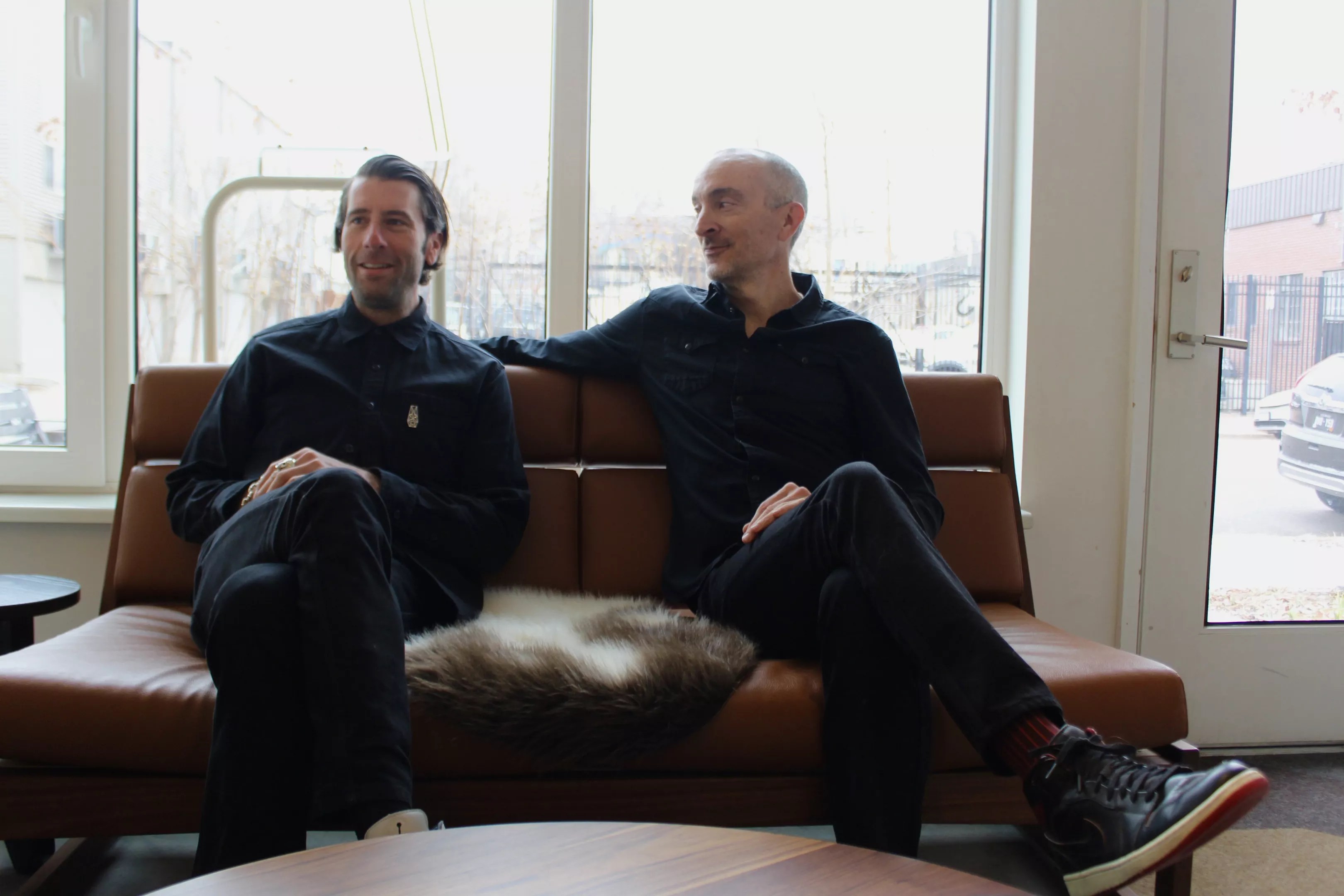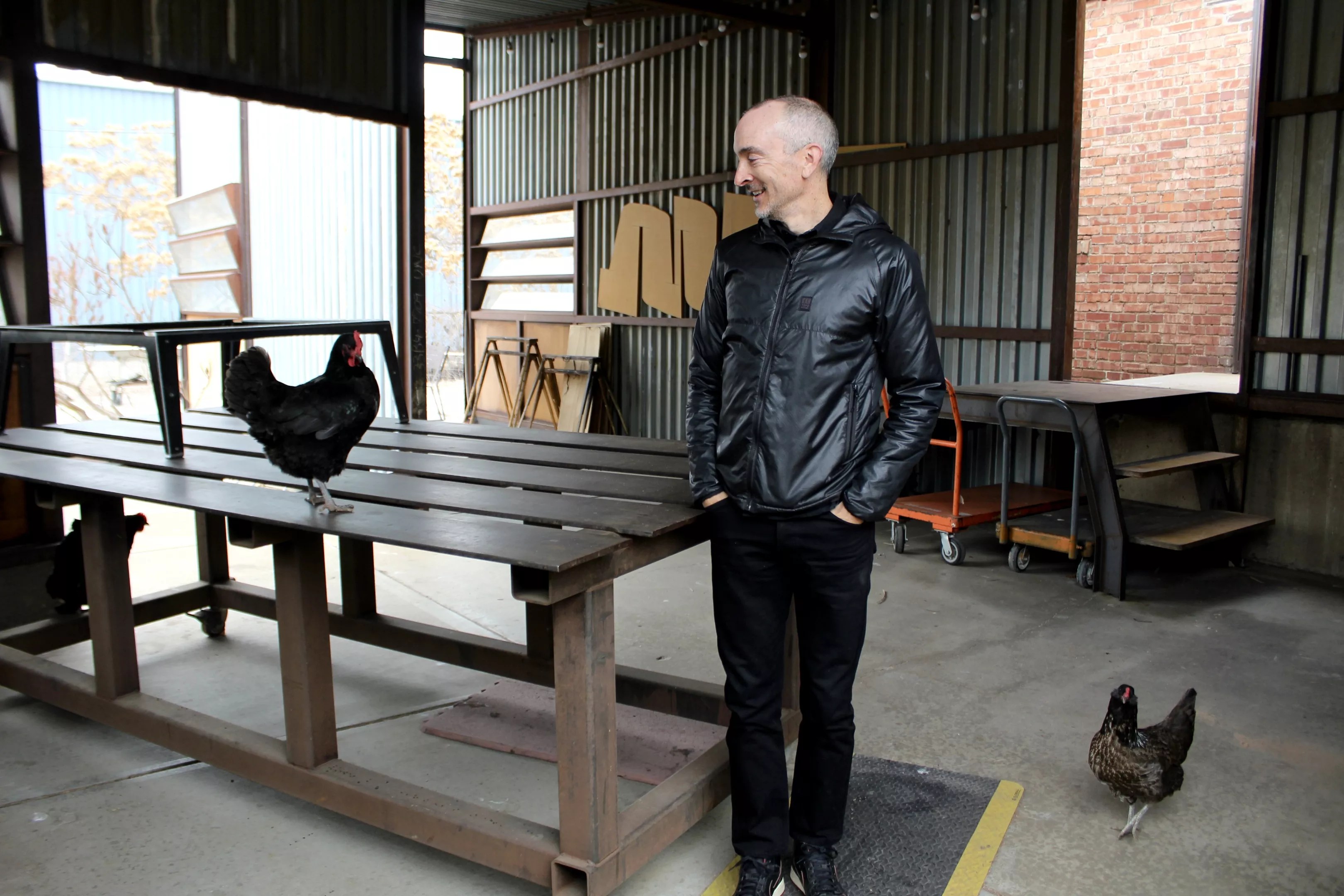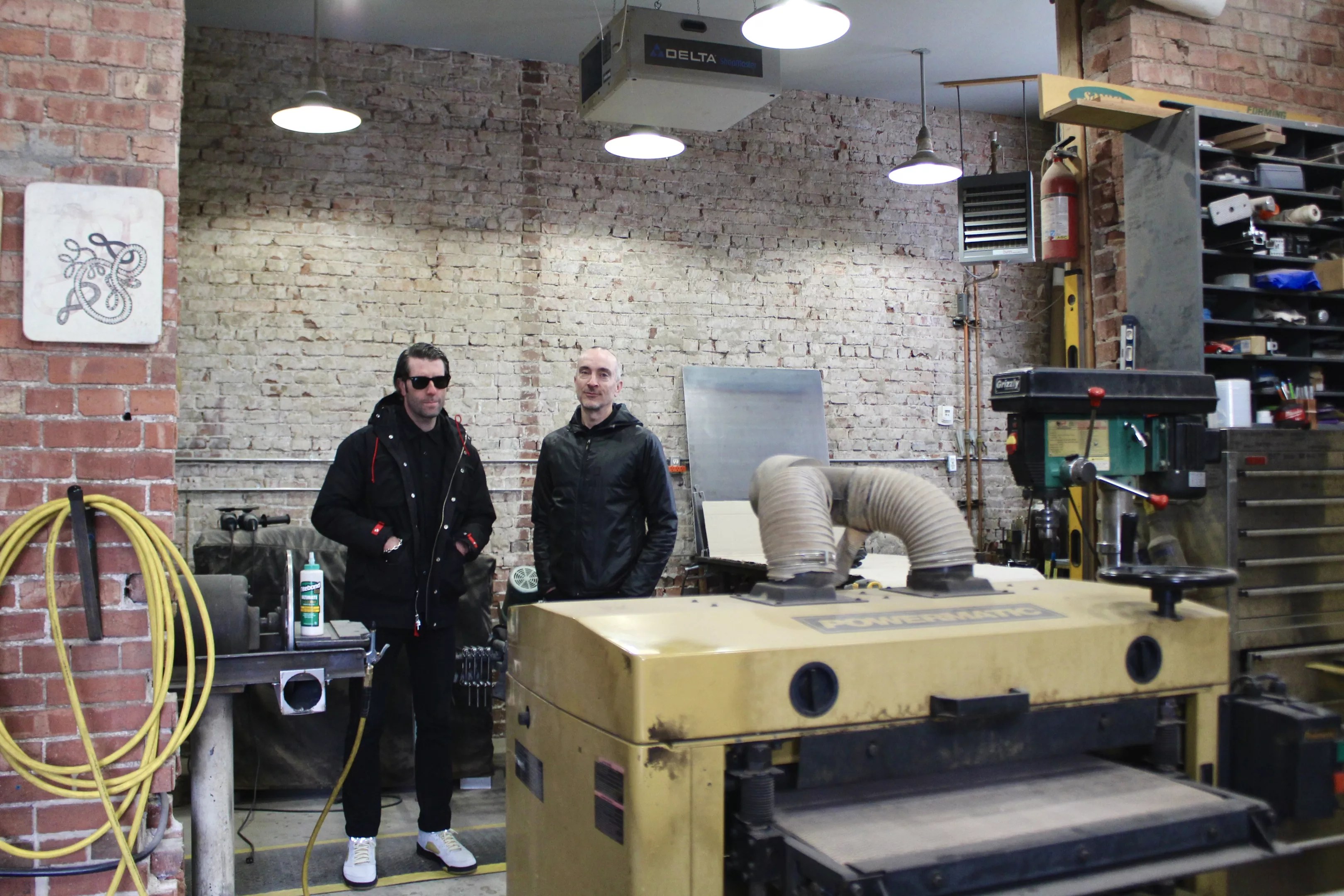
Kristen Fiore

Audio By Carbonatix
Denver furniture designers David Larabee and Dexter Thornton are surrounded by animals.
“We’re not pushing a farm agenda, we’re pushing chickens out of our workspace, constantly,” says Thornton, who co-founded furniture manufacturer DoubleButter with Larabee nearly twenty years ago. The showroom and workshop sit on a lot in Baker that is home to four chickens – Fred Savage, D’Liza, Chickadee and Watermelon – as well as multiple beehives and the occasional hawk, rabbit, fox and raccoon.
But the menagerie doesn’t stop there. Each furniture piece that Larabee and Thornton create is something of a creature itself. The structures are both sleek and playful, and they’re all named after animals.
Larabee and Thornton joined forces after coming across each other at a designer furniture showroom. “We both had sort of lame, respective furniture companies on our own,” Thornton says. “He was the guy to meet in town and I was, too, somehow.”

Dexter Thornton (left) and David Larabee sit on a couch they made for the DoubleButter showroom.
Kristen Fiore
DoubleButter’s signature Roadrunner was the first chair that Larabee and Thornton designed together. “At the time we were making it, we were listening to a ton of Modern Lovers, and they have that iconic song, ‘Roadrunner,'” Larabee recalls. “We listened to it probably 200 times while we made this chair. It was right around the time we were starting to name all the pieces of furniture after animals.”
The Denver Art Museum has a Roadrunner chair and two of Larabee and Thornton’s other chairs in its permanent collection. DoubleButter gifted the Roadrunner chair to the DAM in 2010; it was a part of the What is Modern? exhibit and is still on view. “It was really fun to be part of something like that,” Thornton says. “It feels awfully special.”
Additionally, the Roadrunner chair has a rocking and bar-height version. In keeping with the animal theme, DoubleButter also makes an Armadillo coffee table, a table and desk called the Turtle, Sheep storage pieces, a storage/coffee table hybrid called Sheepadillo and a Grasshopper lounge chair, which has a bounce to it.
The showroom is a narrow space with furniture cheerfully lit up and displayed from floor to ceiling on each wall. Together, the pieces make up an omnibus that is all smooth finishes, artful angles and contemporary pastels. But on closer inspection, there is something humorous about each piece – the slight curve of the Turtle table’s side, the short but sturdy legs of the Sheep storage table.
Many of the pieces have hardwood and steel versions. “We’ve built the entire line around what we’re capable of doing in the spaces we have,” Thornton says. Larabee uses the table saw and Thornton works with the welder, but they both have their hands all over every piece they make. Thornton describes their work in the shop as a “nice ballet.”
All of the furniture is made in DoubleButter’s Baker workshop, with only a few components like fabrication work sent out. The materials are domestically sourced – the hardwoods come from North American forests and the steel is mostly post-consumer scrap steel from U.S. mills. Sustainability is a big part of DoubleButter’s work, and it’s not just limited to those materials. “We always say that the most sustainable piece of furniture is the one you never have to replace,” Larabee says.
Historically, DoubleButter’s client base has been mostly coastal, but the manufacturer is starting to see more local clients. “We always thought Denver had kind of a self-hating attitude – anything that came from Denver wasn’t good enough,” Larabee says. “But I think Denver’s attitudes have changed about that, and there’s a bit more of a push for local.”
More and more, he adds, local architects and interior designers are coming to DoubleButter for projects. The clients are a mix of commercial and residential, but most orders are for large commercial projects like restaurants and bars.
Marketing their products has never been their strong suit, Larabee and Thornton admit; they just want to make furniture. That’s where DoubleButter Business Development Director Mark Hansen comes in.
“I love Denver, so anything that comes out of Denver that’s really exceptional is fun to talk about and amplify,” Hansen says. “I’ve lived around the corner and known these guys for twenty years. Watching them build is amazing.” While the goal is to keep operations local, Hansen hopes to get the word out about DoubleButter so the company can hire locals to help with fabrication and sell more large projects to feed the development of additional projects and expand the line.
Larabee and Thornton have plenty of new ideas they’ve been toying around with, but “the day job is fulfilling orders and meeting payroll and doing that kind of stuff,” Larabee says.
“You’ve been paying yourself?” Thornton jokes. When they do have time, Larabee and Thornton like to organize little urban stunts, or what they call “public service graffiti.” For example, they once made and planted benches in front of the DAM and Museum of Contemporary Art. “It was like, how long is it going to take before the art museum recognizes it? And it turns out, they recognized it pretty quickly,” Hansen says.

“We keep the treats in the shop, and they know that. So they tend to come into the shop when they’re looking for treats,” Larabee says.
Kristen Fiore
And where, exactly, do the chickens fit into all of this? “It’s for no reason other than our own entertainment,” Thornton says. “….And the bees are like little gods over there – busy, busy, busy.” The bees came from a shop that used to operate on the same piece of property.
“There was a Ukrainian dude who was a beekeeper on the side,” Larabee recalls. “He had a trailer for his twenty or thirty hives that he would pull around and rent out for fertilization services to orchards and commercial vegetable production. But when it wasn’t on loan, he would bring the trailer over to the garden. So he taught us, with very limited English, the basics of beekeeping. He wore no protection of any kind and was just unbelievably chill and calm around the bees. We were both completely mesmerized.”
In addition to the bees, Larabee and Thornton keep a vegetable garden and fruit trees on the property, where the chickens wander freely. Larabee says they get a couple of gallons of honey a year and daily eggs from the chickens, although that slows down during the cold months. “One of them is kind of a deadbeat,” Larabee notes. “She doesn’t lay as many eggs, but she’s got feathers on her feet, so who needs eggs when you’ve got feathers on your feet?”
“David means she’s the best chicken,” Thornton adds. “She’s the most goth chicken.”
When the door to the workshop is rolled up, the chickens have free access, but table saws and chickens don’t really mix. “We keep the treats in the shop, and they know that. So they tend to come into the shop when they’re looking for treats,” Larabee says.

“We’ve built the entire line around what we’re capable of doing in the spaces we have,” Thornton says.
Kristen Fiore
“It’s a one-way relationship, too,” Thornton adds. “They’re assholes.” The chickens want their lunch, especially sandwiches. They hate cuddling. And they have beef with the rabbits that sometimes come into the yard. There have also been instances of bees swarming. “It’s amazing we get anything done, really,” he says.
But at the end of the day, Thornton and Larabee love what they do. “It’s just fun stuff and that’s the bottom line. That’s the reason to do something like this for so long,” Thornton says.
There’s something special about getting to be hands-on from an idea’s conception to its literal delivery, Larabee adds. And since the two hope to grow DoubleButter into a longterm venture, they continue to brainstorm and workshop new designs.
“We have enough room for goats, too,” Thornton concludes.
DoubleButter’s showroom is located at 17 Galapago Street in Denver. To see available furniture and learn more, visit doublebutter.com.